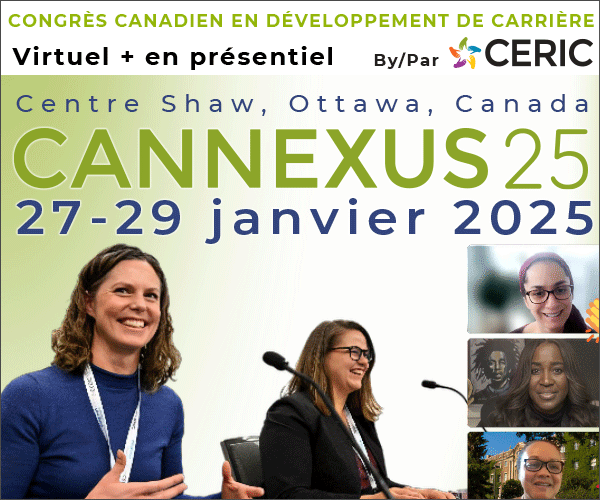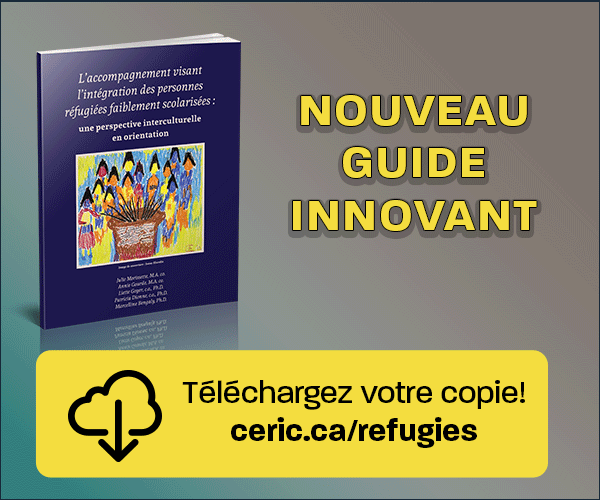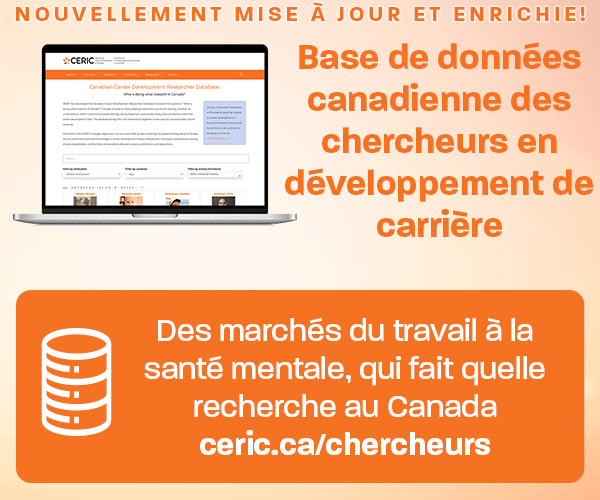Aller au-delà des théories traditionnelles du développement de carrière : Individualiser le conseil en utilisant les théories des étapes cognitives et de l'apprentissage par l'expérience
Mots-clés :
théorie du développement de carrière, carrière traditionnelle, conseil, apprentissage par l'expérience, théorie de l'apprentissage par l'expérienceRésumé
William Perry’s cognitive stage development and David Kolb’s experiential learning theories provide complementary theoretical frameworks, that when used with traditional career development theories, provide a holistic approach to career counseling. In this article the authors explain how these theories can be used to better understand their clients’ developmental needs in order to individualize the career development process.
Références
Belenky, M. F., Clinchy, B., Goldberger, N. & Tarule, J. (1986). Women’s ways of knowing. New York: Basic Books.
Christensen, M., C.Lee, and P.Bugg. (1979, January-February). Professional development of nurse practitioners as a function of need motivation learning styles and locus of control. Nursing Research, 28, 51- 56.
Dewey, John (1958). Experience and nature. New York: Dover Publications.
Friere, Paulo (1974). Pedagogy of the oppressed. New York: Continuum.
Holland, J.L., &Gottredson,G. (1976). Using a typology of persons and environments to explain careeer: Some extensions and clarifications. The Counseling Psychologist. 6(3), 20-29.
Knefelkamp, L. L. & Slepitza, R. (1976). A cognitive-developmental model of career development – an adaptation of the Perry scheme. The Counseling Psychologist, 6(3). 53-57.
Kohlberg, L. (1969). Stage and sequence: The Cognitive-developmental approach to socialization, in Goslin, D.A. (Ed.). Handbook of socialization theory and research. Chicago: Rand McNally.
Kolb, D. (1984). Experiential learning: experience as the source of learning and development. New Jersey: Prentice-Hall.
Kolb, D. (1999). Experienced Based Learning Systems, Inc. Boston, MA.
Krumboltz, J.D. (1979). A social learning theory of career decision making. In A. M. Mitchell, G.G. Jame & J.D. Drumboltz (Eds.). Social learning and career decision making(pp. 19-49). Cranston, RI: Carrole Press
Moore, W. (1987). The Learning environment preferences inventory. Center for the Study of Intellectual Development/The Perry Network. Olympia, WA.
Loevenger, J. (1966). Ego development. San Francisco: Jossey-Bass.
Piaget, J. (1969). The Psychology of the child. New York: Basic Books.
Perry, W. G. (1999). Forms of ethical and intellectual development in the college years: A scheme. San Francisco: Jossey –Bass.
Plovnick, M. (1975, September). Primary care career choices and medical student learning styles, Journal of Medical Education, Vol. 50.
Rotter, J.B. (1966). Generalised expectancies of internal versus external control of reinforcements. Psychological monographs Savickas, M. L. (2003). Advancing the
career counseling profession: objectives and strategies for the next decade. Career Development Quarterly, 52(1), 87-96. Retrieved February 22, 2005 from Academic Search Premier.
Schon, D. A. (1995). The new scholarship requires a new epistemology. Change, 27 (6), 27-34
Super, D.R. (1953). A theory of vocational development. American Psychologists, 8, 185-190.
Wunderlich, R., and Gjerde, C. (1978). Another look at learning style inventory and medical career choice, Journal of Medical Education, 53, 45-54.

Téléchargements
Publié-e
Comment citer
Numéro
Rubrique
Licence

Cette œuvre est sous licence Creative Commons Attribution - Pas d'Utilisation Commerciale - Pas de Modification 4.0 International.











